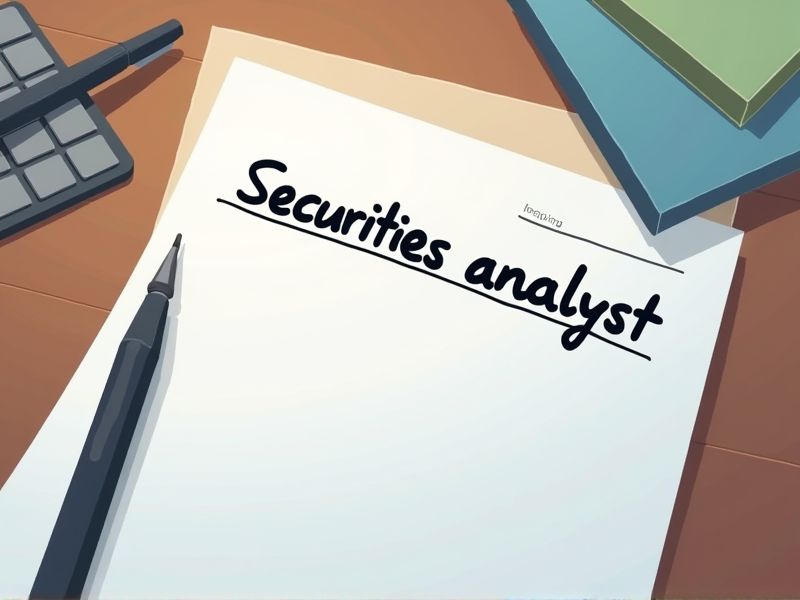
Securities analysts operate in a complex financial environment where skills and credibility are essential for making informed decisions. Certifications provide a structured framework and benchmark for the knowledge required in evaluating market trends and investment opportunities. These credentials also enhance analyst credibility with clients and stakeholders by validating expertise and commitment to professional development. Key certifications that may be needed for a securities analyst are outlined below.
Chartered Financial Analyst (CFA)
A Chartered Financial Analyst (CFA) credential equips securities analysts with a deep understanding of financial markets and instruments, essential for making informed investment decisions. The rigorous training associated with the CFA program enhances analytical skills, directly impacting the quality of investment analysis and recommendations. Many employers recognize the CFA as a hallmark of competence, increasing the trustworthiness of securities analysts in the eyes of clients and stakeholders. Possessing the CFA designation often results in improved career prospects and earning potential due to its recognition as a global standard in the investment profession.
Certified Investment Management Analyst (CIMA)
Certified Investment Management Analyst (CIMA) certification equips securities analysts with advanced investment management skills, enhancing their ability to make informed decisions. Possessing CIMA credentials can lead to increased client trust, as analysts demonstrate a high level of expertise in asset allocation and risk management. The certification's curriculum emphasizes the importance of ethics and professional standards, which can reduce the likelihood of compliance issues. CIMA analysts tend to achieve better investment outcomes by applying comprehensive knowledge of analytic techniques and strategies.
Chartered Market Technician (CMT)
The financial industry increasingly relies on technical analysis, making the Chartered Market Technician (CMT) designation valuable for securities analysts to interpret market trends effectively. Possessing a CMT empowers analysts with advanced skills in charting and risk management, refining their market prediction accuracy. Regulatory environments demand accountability and precision, and CMTs uphold these standards through rigorous, evidence-based methodologies. Competitive job markets highlight the CMT as a differentiator, distinguishing analysts in securing advanced roles and career advancement.
Financial Risk Manager (FRM)
Financial risk managers are needed by securities analysts because they provide expertise in identifying potential risks in investment portfolios. Their skills in quantitative analysis and risk mitigation can enhance the decision-making process for buying or selling securities. They help develop strategies to protect against market volatility, ensuring that investment portfolios align with the risk tolerance of their stakeholders. By doing so, they contribute to achieving the financial objectives while minimizing unforeseen losses.
Certified Financial Planner (CFP)
A Certified Financial Planner (CFP) provides comprehensive financial advice, which is crucial for a securities analyst aiming to develop well-rounded investment strategies. The CFP designation equips professionals with a deep understanding of financial laws and ethics that securities analysts must navigate to ensure regulatory compliance. Expertise in risk management and tax implications from a CFP complements the analytical skills of a securities analyst, enhancing their ability to evaluate investment opportunities. When combined, the insights from both roles can lead to more informed and strategic financial decisions.
Series 7 License
Obtaining a Series 7 license typically allows securities analysts to legally engage in the buying and selling of most types of securities, providing them with a comprehensive understanding of trading regulations. The certification ensures that analysts have the necessary knowledge to make informed and compliant investment recommendations. It enhances their credibility in the industry, improving trust among employers and clients. Without this license, an analyst may face legal restrictions on certain financial activities, limiting their career opportunities and growth.
Series 63 License
State regulations require a Series 63 License for securities analysts to ensure they adhere to the specific laws within each state they operate. This license primarily covers the solicitation of customers and sale of securities, making sure analysts understand legal compliance. Without it, analysts cannot legally advise clients on securities transactions across state lines. The Series 63 thus serves as a safeguard to protect investors and maintain market integrity.
Chartered Alternative Investment Analyst (CAIA)
The CAIA designation equips securities analysts with specialized knowledge in alternative investments, a growing asset class in financial markets. As traditional asset returns stagnate, investors increasingly seek alternatives, making CAIA-designated analysts valuable for their expertise. The curriculum emphasizes risk management techniques crucial for analyzing complex investment products. The credential signifies a thorough understanding of ethical practices, enhancing analysts' credibility with clients and employers.
Certificate in Investment Performance Measurement (CIPM)
Earning the CIPM designation can enhance a securities analyst's credibility by demonstrating expertise in measuring and managing investment performance. It provides analysts with a structured framework to analyze investment risk and return, leading to more informed decision-making. Having the CIPM credential signals a commitment to ethical standards and best practices in performance evaluation, which can attract trust from clients and employers. The specialized knowledge from CIPM can complement the analyst's existing skill set, enabling them to provide deeper insights into portfolio performance and management.
Certified Public Accountant (CPA)
Businesses rely on accurate financial data, and a Certified Public Accountant (CPA) ensures this data is both transparent and credible, which is crucial for securities analysts in assessing a company's financial health. CPAs are skilled in interpreting complex financial information, providing analysts with refined insights into market dynamics and investment risks. The rigorous training and certification process of CPAs equip them with expertise in accounting standards and regulations, assisting analysts with compliance and accuracy in financial evaluations. CPAs often act as intermediators between financial statements and market interpretations, aiding securities analysts in crafting informed investment strategies.
Summary
By obtaining certifications, you enhance your credibility as a securities analyst, making you more attractive to potential employers. Certifications signal your proficiency and dedication, thus increasing trust among clients and stakeholders. As a certified professional, you may experience career advancement opportunities and potentially higher earnings. Your analytical skills are likely to improve, leading to more accurate financial forecasts and analyses.
